| Srl | Item |
| 1 |
ID:
170614
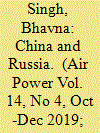

|
|
|
| 2 |
ID:
109129


|
|
|
|
|
| Publication |
2011.
|
| Summary/Abstract |
The aim of this article is to analyze critically the implications of Malawi's changing nature of politics on civil society organizations (CSOs). The article seeks to clarify whether or not the social, political and economic engagement of civil society organizations has contributed to a strengthened relationship between Malawi' government and its own development agenda, given the CSOs' dependence on 'Northern' aid agencies and/or international NGOs. The article argues that while the change from dictatorial regimes to a multiparty political system has enhanced civil society participation in Malawi's social, economic and political issues, the CSO-government relationship is still fraught with suspicion and mistrust.
|
|
|
|
|
|
|
|
|
|
|
|
|
|
|
|
| 3 |
ID:
091133
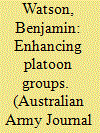

|
|
|
|
|
| Publication |
2009.
|
| Summary/Abstract |
This article identifies the unique ability a platoon group has to achieve success in the complex battlespace. The author takes his experiences as a platoon group commander in Afghanistan and shows that doctrine and combined arms theory have a place in the modern complex battlespace. The article explains that the fundamental infantry platoon cannot be effective in Afghanistan without key enablers from all corps. It further details the importance of fostering relationships between corps to improve combat power and battlefield effectiveness.
|
|
|
|
|
|
|
|
|
|
|
|
|
|
|
|
| 4 |
ID:
085036
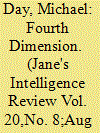

|
|
|
| 5 |
ID:
120985


|
|
|
|
|
| Publication |
2013.
|
| Summary/Abstract |
This article analyses the relationship between violence, the transition from apartheid, and contemporary state formation in South Africa. Through an ethnographic case study of the rural area of Umbumbulu outside Durban in KwaZulu-Natal, the article argues that prevailing interpretations of violence that focus on rivalry between political parties obscure the ways in which other factors - such as local power struggles among customary leaders and strongmen, state support for the rise of warlords, and the recruitment of young men through kinship and patronage networks - helped spread the violence. Local strongmen or warlords were motivated by the quest for power and economic success in their local communities as well as their beliefs in and strategic alliances with national-level political parties engaged in the struggle to end apartheid. In particular, the article focuses on a 'faction fight' in the mid-1980s and the subsequent violence that surrounded two warlords affiliated to the African National Congress in a region that was mostly dominated by Inkatha supporters. The alliances the ANC made with these warlords continued into the post-apartheid period and helped shape the ways in which power was exercised within the new political institutions of the democratic state.
|
|
|
|
|
|
|
|
|
|
|
|
|
|
|
|
| 6 |
ID:
156633


|
|
|
| 7 |
ID:
086354


|
|
|
|
|
| Publication |
2008.
|
| Summary/Abstract |
In terms of area, Kazakhstan is huge country, it being ninth largest country in the world after Russia, Canada, USA, China, Brazil, Autralia, India and Argentina. Its total area is almost equal (about 86 per cent) to that of India.
|
|
|
|
|
|
|
|
|
|
|
|
|
|
|
|
| 8 |
ID:
122262


|
|
|
|
|
| Publication |
2013.
|
| Summary/Abstract |
Should the UK ultimately withdraw from the European Union, it will have a significant impact on Sweden, a like-minded country that is a member of the EU but not of NATO. Anna Sundberg and Kristina Zetterlund argue that, regardless of whether it supports the UK's efforts to renegotiate its relationship with Europe, Sweden should seize the opportunity to debate its current and future defence policy, while the EU should seek to clarify the purposes and functions of the CSDP.
|
|
|
|
|
|
|
|
|
|
|
|
|
|
|
|
| 9 |
ID:
122833
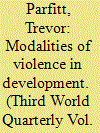

|
|
|
|
|
| Publication |
2013.
|
| Summary/Abstract |
This paper examines the relationship between violence and development. It explores whether violence is an intrinsic (structural) part of development, or a contingent result of poor or mistaken policies and practices that might be corrected. The issue of how far an element of violence might be desirable for development is also considered. These two issues are debated in the context of a variety of approaches to development and in light of various accounts of violence offered by analysts such as Fanon, Benjamin, Critchley and Zizek. In conclusion it is argued that an emancipatory conception of development may be reconciled with Benjamin's idea of divine violence in the form of a Badiouan event-with the proviso that the Derridian conception of the economy of violence is also applied in such a way as to minimise, or at least limit violence.
|
|
|
|
|
|
|
|
|
|
|
|
|
|
|
|
| 10 |
ID:
141353


|
|
|
|
|
| Summary/Abstract |
This article is an attempt to review the religious and historical textual relationship from its sources. And this relationship ought to be taken seriously, because Israel (as a state and culture) considers itself to be the fulfillment of Judaism, and studied in depth in terms of how it affects the political-cultural life in Israel and has a strong impact on the Israeli- Palestinian conflict.
|
|
|
|
|
|
|
|
|
|
|
|
|
|
|
|
| 11 |
ID:
178905
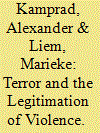

|
|
|
|
|
| Summary/Abstract |
This study investigates the relationship between terrorism and interpersonal violence by conducting cross-national analyses on the effects of terrorism mortality rates on homicide rates. Results show that terrorism appears to be robustly and positively associated with homicide. This finding is based on the calculation of a series of independently pooled and twoways fixed-effects models on a panel that incorporates more than 165 countries over 24 years (1991–2014). The results lend tentative support to the so-called “legitimation-habituation” hypothesis that was formulated in regard to the effects of security-related stress on homicide rates in Israel more than 30 years ago. The topic has been largely neglected ever since. While confirming a positive relationship between terrorism and homicide, this study concludes that a causal influence of terrorism on homicide rates is conceivable, but cannot conclusively be proven within the confines of the research design. Future research on potential mediators of the supposed effect is needed, and data limitations need to be overcome.
|
|
|
|
|
|
|
|
|
|
|
|
|
|
|
|
| 12 |
ID:
139646


|
|
|